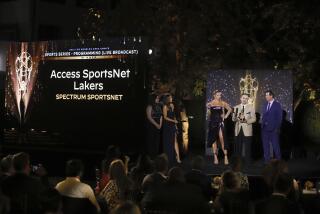Supreme Court will decide major racial bias suit against cable TV giants
- Share via
Reporting from Washington — The Supreme Court said Monday it will decide whether two large cable firms can be sued under the nation’s oldest civil rights law for having refused to carry the programs of an African American-owned network.
At issue is how much evidence of racial bias does a plaintiff need to show to bring a discrimination suit against a company.
Byron Allen, a comedian, entrepreneur and owner of Los Angeles-based Entertainment Studios Networks, said he repeatedly contacted Comcast and Charter Communications over several years seeking to have seven of his channels carried on those cable networks.
He said in 2015 those companies had made no licensing deals with programming firms owned by African Americans, and he alleged several executives at Charter had made racially derogatory comments. He filed a $10-billion discrimination suit against Charter and a $20-billion claim against Comcast.
A federal judge in Los Angeles dismissed the suit against Comcast for a lack of evidence, while another judge refused to dismiss the one against Charter. In February, the 9th Circuit Court of Appeals cleared both suits to proceed, ruling the cable firms could be held liable if racial bias was “a motivating factor” in their refusal to do business with Allen’s firm, even if it was not the deciding factor or the actual cause.
The discrimination suit was brought under the Civil Rights Act of 1866. Adopted by the Reconstruction Congress, it said “all persons … shall have the same right” to “make and enforce contracts … as is enjoyed by white citizens.”
The Supreme Court in recent decades has set a higher bar for some anti-discrimination laws, ruling that plaintiffs must prove that illegal bias was the actual cause of an employer’s decision to fire or not hire someone. But the 9th Circuit said the older civil rights law made clear that African Americans were entitled to the “same rights” to make contracts. “If discriminatory intent plays any role in a defendant’s decision not to contract with a plaintiff, even if it is merely one factor and not the sole cause of the decision, then that plaintiff has not enjoyed the same right as a white citizen,” Judge Milan D. Smith Jr. wrote in a 3-0 decision.
He said it was possible the programming decisions made by the cable companies were “attributable wholly to legitimate, race-neutral considerations,” but the appeals court refused to block the discrimination suits at a preliminary stage. The allegations in the complaint suggest that “discriminatory intent played at least some role in Charter’s refusal to contract with Entertainment Studios, thus denying the latter the same right to contract as a white-owned company,” the 9th Circuit concluded.
Lawyers for Charter and Comcast filed separate appeals to the Supreme Court. Comcast’s lawyer described Allen’s suit as alleging an “outlandish racist conspiracy.” The appeals said several of his channels, including Comedy.TV and Recipe.TV, seek to target the same audience as better-known channels such as Comedy Central and the Food Network, which are carried by the two cable companies. And Comcast said it carries several networks that are partly owned by African Americans and two networks that are “wholly owned by African-Americans: Africa Channel and Black Family Channel.”
Both firms urged the Supreme Court to hear the case and to rule that a federal civil rights suit requires proof of actual discrimination. This is referred to as “but-for causation,” meaning the decision would not have been made but for racial bias.
The court said it will hear the case of Comcast vs. National Assn. of African American Owned Media and Entertainment Studios Networks in the fall.
Comcast, based in Philadelphia, said in a statement it “has an outstanding record of supporting and fostering diverse programming, including programming from African-American owned channels.” The company said there has “been no finding of discriminatory conduct by Comcast against this plaintiff because there has been none. We hope the Supreme Court will reverse the 9th Circuit’s unusual interpretation of the law and bring this case to an end.”
Allen issued a statement calling the high court’s announcement “historic, and we are on the right side of history.” He called Comcast’s assertion misleading. “The networks Comcast refers to as ‘African American-owned’ are not wholly owned by African Americans, and did not get any carriage until I stood up and spoke out about this discrimination and economic exclusion,” he said.
More stories from David G. Savage »
More to Read
Get the L.A. Times Politics newsletter
Deeply reported insights into legislation, politics and policy from Sacramento, Washington and beyond. In your inbox three times per week.
You may occasionally receive promotional content from the Los Angeles Times.











